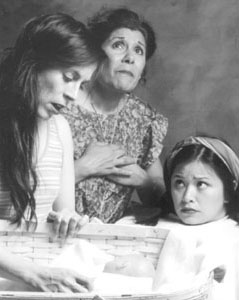![[Metroactive Stage]](/stage/gifs/stage468.gif)
[ Stage Index | San Jose | Metroactive Home | Archives ]
 Not So Sweet: Carmen Elena Sosa, VIVIS and Selena Sue Navarro suffer the consequences of pesticide-ridden foods.
Not So Sweet: Carmen Elena Sosa, VIVIS and Selena Sue Navarro suffer the consequences of pesticide-ridden foods.
Poisoned Ground 'Heroes and Saints' shows the effects of pesticides on a human level By Heather Zimmerman WITH AUTUMN UPON us, Teatro Visión presents a drama that explores how this season's bountiful harvest isn't always as wholesome as those Thanksgiving images of overflowing cornucopias suggest. With Heroes and Saints, playwright Cherríe Moraga personalizes an ongoing struggle over pesticide usage in California agribusiness that might make audiences look differently at the next artichoke or grape they encounter. Moraga based the play on events that took place in the late '80s in a small San Joaquin Valley farming town, where agribusiness's rampant pesticide spraying in vineyards caused epidemics of cancer and birth defects. Now 18 and very bright, Cerezita (Selena Sue Navarro) was born without limbs and spends her days concealed in a wheelchair draped with black cloth. Despite similar catastrophic ailments throughout the neighborhood, Cerezita's mother, Dolores (VIVIS), turns the blame for her child's misfortune on herself and refuses to join a growing citizens' movement against pesticides. But Cerezita becomes determined to take part in the protests. Heroes and Saints works best when it focuses on the individuals affected by this wholly man-made plague: the earthy Amparo (Rose Maria Escalante), the protest leader not unlike Dolores Huerta; Cerezita's sister, Yolanda (Carmen Elena Sosa), a conscientious new mother; and Dolores, still privately grieving for her daughter's deformity. Moraga effectively drives home the bitter irony that everything in this town that should nourish instead poisons because of pesticides, from grape crops to mother's milk. However, the play tackles too many issues too broadly: AIDS even briefly enters the picture, perhaps only relevant here because, like stopping pesticide usage, in the '80s it was another hot potato for the government. The side issues, as addressed here, seem to be digressions from the characters' fight for a safe place to live and work. Additionally, Moraga doesn't always allow her characters to speak for themselves, routinely inserting an intrusive, highly stylized voice that makes it seem like they have suddenly channeled the playwright. The characters unexpectedly burst out with poetic monologues, the fanciful language of which has the strange effect of almost romanticizing these people's plight. What's heroic and saintly about the community Moraga shows us lies in its people's everyday experience: facing the dangers of working the contaminated fields in order to feed their families while fighting the practices of the corporations that poison them, the same corporations on which the workers are forced to depend for livelihood. Moraga gilds the lily of her characters' heroism; she needn't, because she shows us courage readily apparent in their daily lives.
Heroes and Saints plays Thursday and Friday at 8pm, at the Mexican Heritage Plaza, 1700 Alum Rock Road, San Jose. Tickets are $14-$17; 800.MHC.VIVA. [ San Jose | Metroactive Central | Archives ]
|
From the October 18-24, 2001 issue of Metro, Silicon Valley's Weekly Newspaper.
Copyright © 2001 Metro Publishing Inc. Metroactive is affiliated with the Boulevards Network.
For more information about the San Jose/Silicon Valley area, visit sanjose.com.